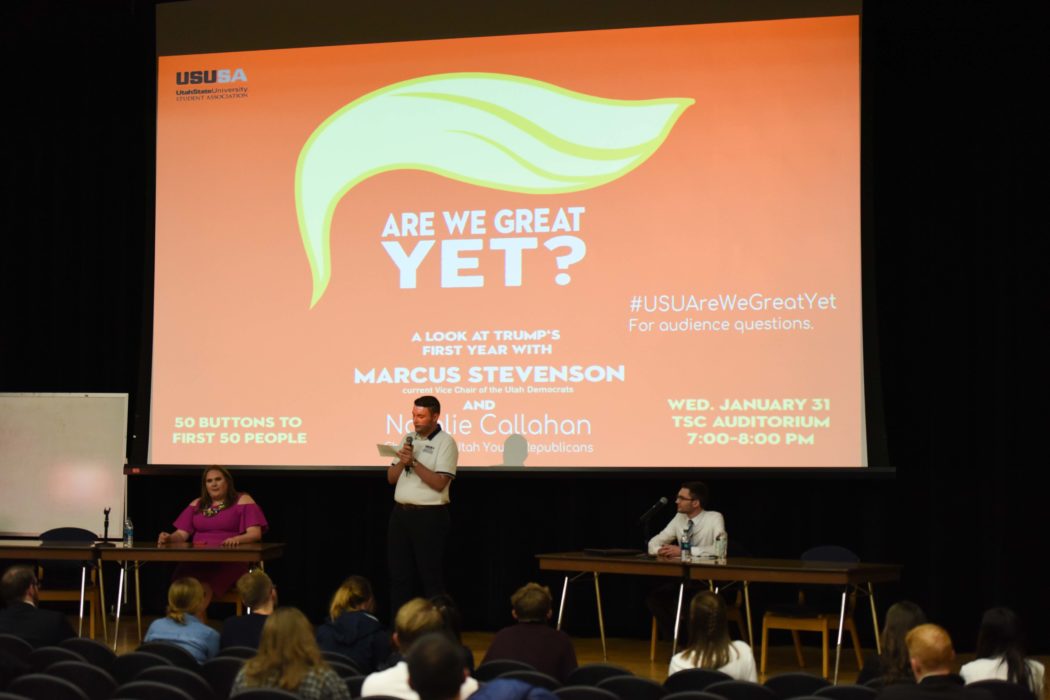Are we great yet? Two college-aged debaters aim to answer
Natalie Callahan stepped onstage in the Utah State University Taggart Student Center auditorium Wednesday night wearing a flowing pink dress, a thick, colorful beaded necklace and silver high heels, kicking off the Government Relations Council-sponsored debate with an element of humor.
The debate’s topic, coined “Are We Great Yet?” was evaluating President Donald Trump’s first year in office. Originally, Don Peay, then-candidate Trump’s Utah Campaign Chair during the election was scheduled to speak. However, due to a last-minute cancellation, Callahan took his place.
“I wore some sparkly shoes in case it gets too heated,” the 23-year-old chair of Utah Young Republicans said with a smile on her face and a joke in her tone, adding that she could be like Dorothy, the main character in The Wizard of Oz, and “click my heels and get out of here” if conflict arose.
Callahan proceeded to compare President Donald Trump’s time in office to the political involvement experience of a typical millennial.
“Our voices are very rarely wanted, and when they’re wanted, sometimes they’re not appreciated. When you finally get a seat at the table, you have to fight everyday not to give up,” she said. “We have a president that doesn’t quite fit in. He isn’t exactly what they were wanting, his voice is rarely appreciated, but he fought for a seat at the table and he got one in the Oval Office.”
Then her opponent, Marcus Stevenson, made his opening remarks with a personal story.
Stevenson, the nation’s youngest vice chair of a state Democratic Party at 23, told the audience about his nephew with Down syndrome, who Stevenson said has undergone $500,000 in medical procedures. He also talked about his sister with Crohn’s disease, an illness which also requires extensive medical treatment.
“If my family didn’t have insurance, we have no idea what we would have done,” he said. “I’m a Democrat because we need to be fighting for these issues. We need to be fighting for families, we need to be fighting for children, we need to be fighting for minorities in our country that our president seems to not care at all about.”
Moderator Alex Hall of the GRC then began the debate with a question of how international perception of the United States has changed in the Trump era.
Stevenson answered bluntly.
“To put it simply, we look like fools,” he said. “Each time President Trump travels around this world, he’s being protested constantly.”
He added, “His words, his actions do not stay within our borders — they travel far and wide.”
The Democratic vice chair then criticized Trump’s tight-knit relationship with Russian President Vladimir Putin.
“We have a president who wants to be best friends with Putin,” Stevenson said. “If you’ve taken any international politics classes, you understand well why we don’t deal with Russia and why Putin is not the person we want to be best friends with.”
Callahan first expressed sympathy for the health problems Stevenson’s family had experienced, then took a stab at promoting Trump’s economic policy and how she believed it has improved the United States’ reputation.
“President Trump has put forth some very competitive economic strategies, economic goals and historic tax reform that has forced countries like China to change how their taxes work to try to bring in business … and compete with the United States,” she said.
The conversation then shifted away from policy and onto a much hotter topic: Twitter.
Callahan defended the president’s tweets, notorious for criticizing the “fake news” and insulting his political enemies.
“Whether or not you like the tweets, people are checking in, people are engaging,” she said. “President Trump speaks to the everyday American — that’s who voted for him and that’s who he’s speaking to.”
Those words didn’t sit right with Stevenson.
“Fake news is such a scapegoat for our president and for anyone who wants to defend his policies,” he said. “These rallies that he holds, it’s constantly for his base. He’s leaving out the average American in this country.”
The debate fell deeper into controversial topics when Hall asked, “Is the Trump administration working in the best interest of women and minorities?”
Callahan began her answer by saying, “It’s always kind of amazing to me, because you have Hillary Clinton, but let’s talk about her husband Bill Clinton, who has some pretty serious skeletons in his closet when it comes to women,” she said. “That somehow doesn’t diminish what he’s accomplished, but you want to talk about President Trump.”
Without discussing details of Bill Clinton’s sexual misconduct allegations, Callahan then discussed the president’s high number of women in his administration and “programs that are supporting women in the workplace.”
Speaking with a joking-yet-serious tone, Stevenson asked, “Am I allowed to swear here?”
The audience let out a roar of laughter, then fell into a serious silence.
Stevenson then answered, “I don’t understand how women can vote for Trump and be OK with that. It doesn’t make sense to me.” He then referenced the president’s taped remarks in which he “brags about sexually assaulting a woman.”
After answering another question from Hall, the debaters took questions submitted on Twitter ranging from economic growth and healthcare to athletes kneeling for the National Anthem.
Though the candidates spent an hour disagreeing with each other, they ended on a unifying note: gratitude for the right to free speech, allowing them to debate without fear of political backlash or harm.
@alison__berg

